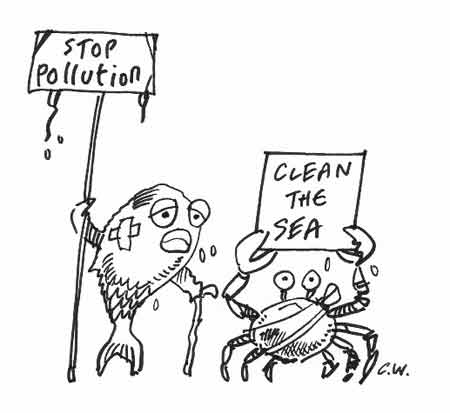|
|
|
I am just back from a very interesting meeting in Manila of the East Asian countries attended by ministers from 15 of them including China, Japan, Malaysia, Singapore and both Koreas. Encouragingly, the summary at the end of the meeting incorporates the statement that fish is not important for its protein content but as 'brain food'. The message is sinking in! A very good Japanese paper by Tanaka reportedthat the government sponsored work they have been carrying out for the last 15 years on enhancing natural productivity through optimizing the ecological conditions for the various marine species (a subject on which I have often spoken). They showed how productivity can be increased, and hence food production increased, just by enhancing the breeding and feeding grounds of the different fish species. A point I made was that this approach will help reduce acidification (fixes CO2) and reduce global CO2 as there will be enhanced photosynthesis from the sea weeds, phytoplankton etc. Kelp forests also provide breeding grounds and food for fish so enhancing the natural productivity whilst at the same time sucking down CO2. Coral reefs can be similarly generated. In Oman they imported Japanese coral seeding and have been surprised how much faster the coral is growing in their waters compared to the rate it grows in Japanese waters. However, none of this can be done without cleaning pollution. The Singapore Under-secretary commented that 80% of marine pollution comes from the land. This lethal toxicity has to stop and be eradicated.
I have been deeply concerned about the polluted condition of our rivers, estuaries and coastal waters ever since a visit to the Museum of London where I learnt that prior to and at the beginning of the last century the bar men used to go down to the Thames with their buckets and fill them with oysters to put on the bar free for those who bought beer. Now of course the Thames estuary is dead. The same has happened to the Firth of Forth in Scotland. Whenever there was something to celebrate my father used to take us to a pub called the Crammond Inn, at the mouth of the Crammond River with views of the Forth Bridge. It was renowned for its sea food, all gathered locally. However my father and other locals I recall in the late 1940s, protested about a paper factory up stream that was polluting the water and killing the fish. The inquiry stated that progress could not be halted just because some gentlemen wanted to fish on a Saturday. In 1965, on returning from five years in East Africa, My wife and I took my mother and brother and his wife back to celebrate at Crammond Inn. It was a beautiful summer evening in July. We parked the car and as we walked to the front door we paused to admire the view of the famous bridge. There in front of us was a brand new, yellow notice - Both oysters and mussels are rich in trace elements. So, with the pollution of both rivers we have lost a source of cheap (give away in the bars) food, rich in vital trace elements such as iodine. Estuaries should be the places where the marine food chain takes off in earnest with nutrients washed down from the land and the shallow water which allows sunlight to penetrate to the sea floor (it usually only goes down about 100M but can reach 200M in clear conditions.) We need to know how quantitatively important this would have been before virtually all estuaries world wide were destroyed like the Thames and Firth of Forth, as there could be an argument that the pollution of the rivers, estuaries and coast lines is as important as deforestation, if not more so. Estuarine and coastal pollution could be one of the biggest contributors for so called global warming or climate change; maybe bigger than the motor car. Professor Crawford is Director of the Institute for Brain Chemistry and Human Nutrition at the London Metropolitan University
FOOD SECURITY AND LIVELIHOOD MANAGEMENT: Theme keynote: Michael Crawford, discussed the importance of marine resources in providing docosahexaenoic acid (DHA), an omega-3 fatty acid important in brain development as well as the trace elements such as iodine, zinc and selenium which are at their richest in the marine food web. He noted that the costs associated with mental health problems presently exceed those of cancer and heart disease combined, and emphasized that aquaculture and marine agriculture must be prioritised to bridge the gap from capture fisheries.
Click here for more research reports First Published December 2009 |













